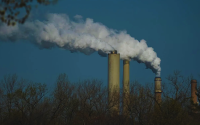26 October 2005Antonio Regalado
Two global-warming skeptics who questioned an influential climate study and prompted a congressional inquiry are now facing critics of their own, as a pair of new research papers take issue with their results.
The new findings are the latest round in a politically charged dispute over the "hockey stick," a widely publicized graphic showing that temperatures during the late 20th century were likely higher than at any time in the past 1,000 years.
The hockey stick, so-called because global temperatures show a sharp blade-like rise in recent decades, was prominently featured in a 2001 United Nations report that said the burning of fossil fuels is the cause of global warming.
A dispute erupted earlier this year when oil and minerals consultant Stephen McIntyre and economist Ross McKitrick, both Canadians, published a scientific study detailing possible mathematical errors in the hockey-stick result.
Michael Mann, the Pennsylvania State University climatologist who was the author of the hockey-stick findings, claimed the charges were part of a campaign to cast doubt on global warming.
The clash broadened in June, when Rep. Joe Barton (R., Texas), head of the House Energy and Commerce Committee, ordered an inquiry into the work of Dr. Mann and two co-authors and requested extensive details of their methods and data.
Critics accused Rep. Barton of seeking to bully scientists and chill global-warming research. Until Dr. Mann turned his mathematical procedures over to the committee in July, he had declined to provide his scientific critics with a complete description of them.
In a written statement, Larry Neal, a spokesman for the committee, said the inquiry is justified because "combating global climate change is a trillion-dollar prospect" that would be funded by taxpayers. Mr. Neal said the committee staff hasn't yet begun a detailed analysis of the information it collected from scientists.
Now, two independent research reports say the Canadians' critique may have limited significance. The studies, appearing this month in the journal Geophysical Research Letters, find that while there is a statistical snafu in the hockey-stick math, it may not strongly affect the graph's accuracy.
One study, from researchers at the GKSS Research Center in Geesthacht, Germany, confirmed "a glitch" in Dr. Mann's work but "found this glitch to be of very minor significance" when applied to some computer-generated models of climate history, according to a statement released by lead author Hans von Storch.
The other study, by Woods Hole Oceanographic Institution fellow Peter Huybers, argued the Canadians had overstated the effect of the problem. "The truth is somewhere in between, but closer to Dr. Mann," Dr. Huybers said. Both Dr. Huybers and Eduardo Zorita, a collaborator of Dr. von Storch, agreed they had yet to address all of the Canadians' criticisms.
The complex debate, which turns on statistical technicalities, isn't likely to end soon. In replies published in the same issue of the journal, Mr. McIntyre and Mr. McKitrick defended their conclusions. "We are not withdrawing an inch," Mr. McIntyre said in an interview.
The dispute was the subject of a page-one story in this newspaper in February.
Some scientists believe the dispute has more political weight than scientific significance. That's because, they say, other studies of past temperatures also indicate they are higher now, on average, than at any time in past 1,000 years, and perhaps far longer. "A number of studies all come to the same conclusion," Dr. Mann said.
![[Temperature Tracker]](http://online.wsj.com/public/resources/images/NA-AG757_CLIMATE10252005195317.gif) Antonio Regalado at [email protected]
Antonio Regalado at [email protected]






